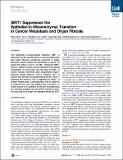SIRT1 Suppresses the Epithelial-to-Mesenchymal Transition in Cancer Metastasis and Organ Fibrosis
Author(s)
Simic, Petra; Williams, Eric O.; Bell, Eric L.; Gong, Jing Jing; Bonkowski, Michael S.; Guarente, Leonard Pershing; Williams, Eric O.; ... Show more Show less
DownloadSimic-2013-SIRT1 Suppresses the.pdf (2.333Mb)
PUBLISHER_CC
Publisher with Creative Commons License
Creative Commons Attribution
Terms of use
Metadata
Show full item recordAbstract
The epithelial-to-mesenchymal transition (EMT) is important for the development of cancer metastases and organ fibrosis, conditions prevalent in aging. Because sirtuins affect the pathology of aging, we tested the effect of SirT1 on EMT. Reduced SIRT1 levels in HMLER breast cancer cells led to increased metastases in nude mice, and the loss of SIRT1 in kidney tubular epithelial cells exacerbated injury-induced kidney fibrosis. SIRT1 reduces EMT in cancer and fibrosis by deacetylating Smad4 and repressing the effect of TGF-β signaling on MMP7, a Smad4 target gene. Consequently, less E-cadherin is cleaved from the cell surface and β-catenin remains bound to E-cadherin at the cell-cell junctions. Our findings suggest that the SIRT1/Smad4/β-catenin axis may be a target for diseases driven by EMT.
Date issued
2013-04Department
Massachusetts Institute of Technology. Department of Biology; Paul F. Glenn Center for Biology of Aging Research (Massachusetts Institute of Technology)Journal
Cell Reports
Publisher
Elsevier
Citation
Simic, Petra, Eric O. Williams, Eric L. Bell, Jing Jing Gong, Michael Bonkowski, and Leonard Guarente. “SIRT1 Suppresses the Epithelial-to-Mesenchymal Transition in Cancer Metastasis and Organ Fibrosis.” Cell Reports 3, no. 4 (April 2013): 1175–1186.
Version: Final published version
ISSN
22111247